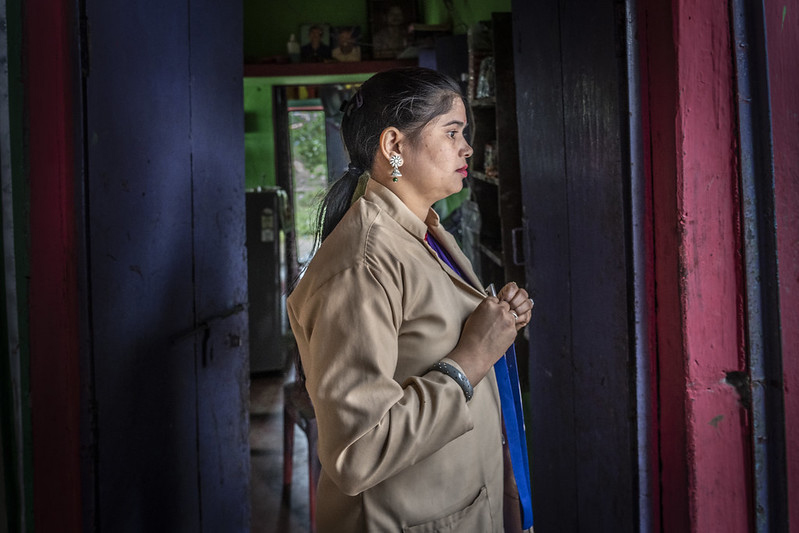
As Vandana Lodhi looks into the mirror to get ready for her work, she often reflects on how far she has come in the last five years, both personally and professionally. Vandana, 28, is a community health worker, or Accredited Social Health Activist (ASHA), and serves the people of Diwari Village in Madhya Pradesh, India.

Vandana took on this role in 2019, when she was going through one of the lowest phases of her life. Her husband died in 2018, a year after their wedding. “When I lost my husband so suddenly,” she says, “it was an extremely tough time for me. I was two and a half months pregnant with our child. I could see nothing but darkness in my future.“
At that time, Vandana’s father-in-law encouraged her to become an ASHA worker. He spoke with the village leaders and suggested her name. The fact that she was more educated than most women in the village, having an undergrad degree, helped.
“Aryan, my son, is now five,” says Vandana. “Almost six,” quips the perky boy, correcting his mother as he pretends to play with her phone from a room that doubles as a small store run by Vandana’s mother-in-law.
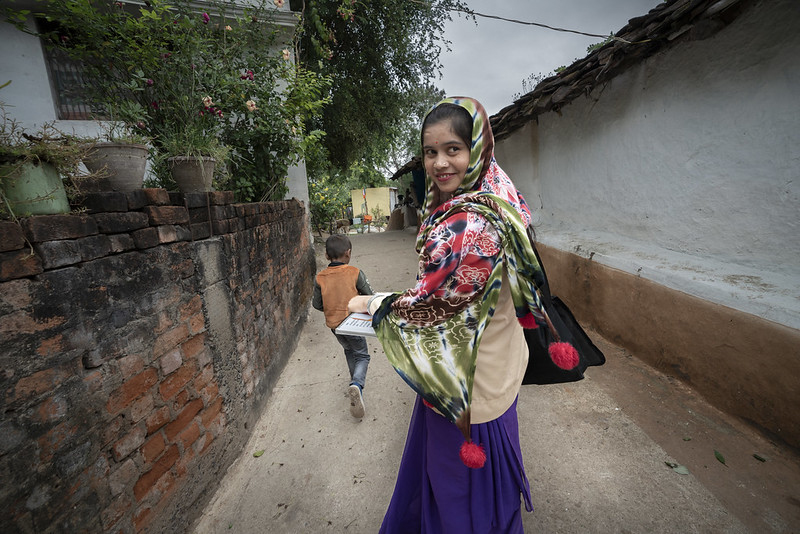
Vandana’s days are busy, ensuring the health and wellbeing of the 310 people in her village, especially the women and children. “I distribute iron and calcium tablets to pregnant women, ensure that they attend antenatal checkups, accompany them for their deliveries, ensure care for their newborns and young children and connect those who have issues with the health system. I inform women and families about family planning, right from a new bride to those who have completed their families,” says Vandana.
I tell pregnant women about the family planning options they can choose from right after delivery—like postpartum intrauterine contraceptive device . . . I carry condoms, oral contraceptive pills and Centchroman tablets in my kit.
Vandana Lodhi

“The biggest struggle in this community is poverty,“ Vandana explains. “I try and explain the value of family planning to my villagers, to women and their husbands.” And handing people a method of their choice right there and then helps a great deal, she adds.
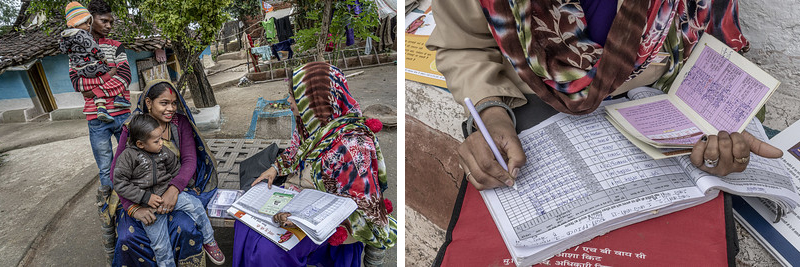
An initiative of the government of India that has been a game-changer in enabling ASHAs like Vandana to distribute family planning methods to their communities’ women and men is the Family Planning Logistics Management Information System (FPLMIS). FPLMIS is a mobile phone application, or app, that allows ASHAs to order family planning methods for community distribution. USAID’s MOMENTUM Country and Global Leadership: India-Yash, led by Jhpiego, is providing technical support in 10 states of India in the rollout of the app.
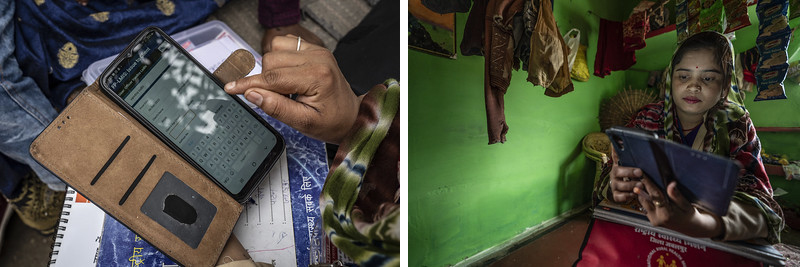
This support includes mapping of facility and FPLMIS users, offering training, implementing the online app for supply chain management, and optimizing transportation systems—all contributing to the successful rollout of this innovative program that aims to prevent supply chain disruptions. So far, 155,887 ASHAs like Vandana are trained and successfully using the FPLMIS application to manage family planning commodities and ensure their delivery to eligible clients.
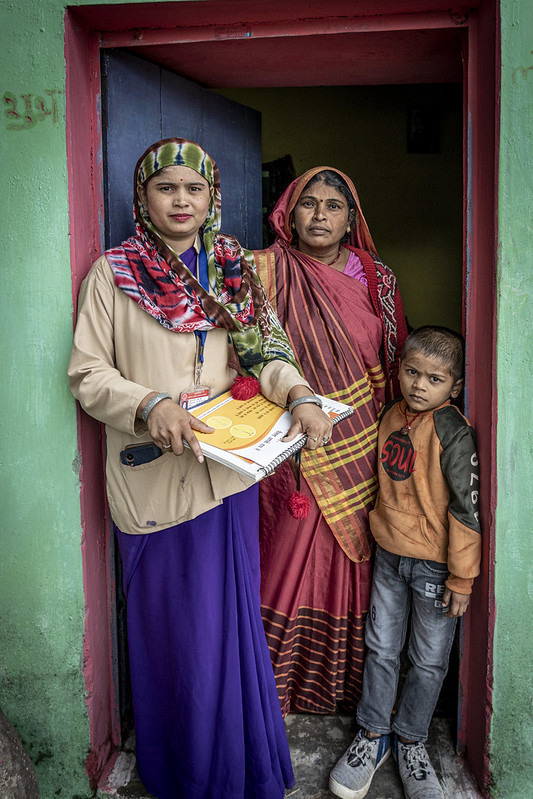
“I received the FPLMIS training in 2020. This application is very useful. Earlier, we had to rely on others to get us the contraceptive supplies from the hospital. This would lead to shortages, stock-outs or even wastage of unwanted inventory. Some women would endure a break in their family planning usage due to a supply gap, leading to an accidental pregnancy. Now we ourselves order family planning methods as per our community’s needs. There are no stock-outs now,” says Vandana.
There are many things Vandana loves about her job. “I feel happiest when I am able to help the women in need, especially those who don’t have the resources or the information to plan their families,” she says. “My wish for my community is for them to educate their children well. And this is possible only if they have smaller families. They will then be able to do well within their resources.”
When asked about herself, she smiles. “I find my job empowering and want to progress in my field. I want to work hard and become an ASHA supervisor one day. I want my son to study and do well in his life, too. I have the support of my mother-in-law. I see my future as bright!”
A mobile app to efficiently manage family planning supplies
Problem: Insufficient timely supply of contraceptives at public health facilities in India due to overstocking, stock-outs and excessive paperwork. This was especially problematic for community health workers trying to meet the family planning needs in their communities.
Solution: A digitized application introduced by the government of India to streamline supply chain operations, reduce disparities and regulate the flow of family planning supplies. The Family Planning Logistics Management Information System (FPLMIS) addresses supplies at every level of the health system, down to the frontline health workers, district and block storekeepers, and, most important, women and their partners.
Outcome: USAID’s MOMENTUM Country and Global Leadership: India-Yash supports 10 states of India in the rollout of the app. So far, 255,865 FPLMIS users have been mapped, and out of all ASHAs mapped at village level, 71% (or 155,887) use the FPLMIS app to order commodities and ensure delivery to women. The total average stock-out of all contraceptives at district level decreased from 25% to 4%; at block level, this decrease in stock-out was recorded from 35% to 15%.
Anne Pfitzer, Technical Director of Family Planning for the Jhpiego-led MOMENTUM Country and Global Leadership project, reviewed this story.
Indrani Kashyap, Associate Director, Regional Global Communications, is based in Jhpiego’s New Delhi office. Photographer Karen Kasmauski works as a consultant for Jhpiego.



